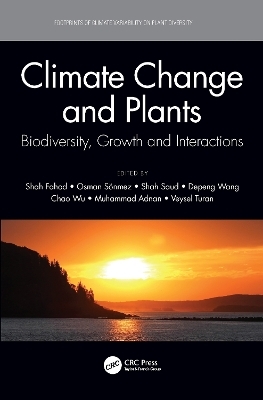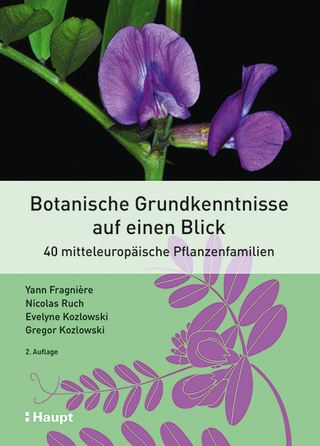
Climate Change and Plants
CRC Press (Verlag)
978-0-367-62327-2 (ISBN)
- Lieferbar (Termin unbekannt)
- Versandkostenfrei innerhalb Deutschlands
- Auch auf Rechnung
- Verfügbarkeit in der Filiale vor Ort prüfen
- Artikel merken
Climate Change and Plants: Biodiversity, Growth and Interactions
Evidence is raised daily of the varying climate and its impression on both plants and animals. Climatic changes influence all agriculture factors, which can potentially adversely affect their productivity. Plant activities are intimately associated with climate and concentration of atmospheric carbon dioxide. Climate Change and Plants: Biodiversity, Growth and Interactions examines how plant growth characters influence and is influenced by climate change both in past and present scenarios. This book covers cutting-edge research of key determinants of plant growth in response to atmospheric CO2 enhancement and global warming.
Features
Discourses numerous areas of sustainable development goals projected by the UN as part of the 2030 agenda
Highlights appropriate approaches for maintaining better plant growth under changing climatic conditions
Presents diversity of techniques used across plant science
Is designed to cater to the needs of researchers, technologists, policymakers and undergraduate and postgraduate students studying sustainable crop production and protection
Addresses plant responses to atmospheric CO2 increases
Dr Shah Fahad is an Assistant Professor in the Department of Agronomy, University of Haripur, Khyber Pakhtunkhwa, Pakistan. He obtained his PhD in Agronomy from Huazhong Agriculture University, China, in 2015. After doing his postdoctoral research in Agronomy at the Huazhong Agriculture University (2015–17), he accepted the position of Assistant Professor at the University of Haripur. He has published over 190 peer-reviewed papers with more than 160 research and 30 review articles, on important aspects of climate change, plant physiology and breeding, plant nutrition, plant stress responses and tolerance mechanisms, and exogenous chemical priming-induced abiotic stress tolerance. He has also contributed 20 book chapters to various book editions published by Springer, Wiley-Blackwell, and Elsevier. He has edited six book volumes, including this one, published by CRC press, Springer, and Intech Open. He has won Young Rice International Scientist award and distinguish scholar award in 2014 and 2015 respectively. He has worked and is presently continuing on a wide range of topics, including climate change, greenhouse emission gasses, abiotic stresses tolerance, roles of phytohormones and their interactions in abiotic stress responses, heavy metals, regulation of nutrient transport processes. Prof. Dr. Osman SÖNMEZ is a Professor in the Department of Soil Science, Faculty of Agriculture, Erciyes University, Kayseri, Turkey. He obtained his MS and PhD in Agronomy from Kansas State University, Manhattan-KS, USA in 1996-2004. In 2014 he accepted the position of Associate Professor at the University of Erciyes. Since 2014, he has worked in Department of Soil Science, Faculty of Agriculture at Erciyes University. He has published over 90 as peer-reviewed papers, research and review articles on soil pollution, plant physiology and plant nutrition. Dr Veysel Turan is an Assistant Professor in the Department of Soil Science and Plant Nutrition, Bingöl University, Turkey. He obtained his PhD in Soil Science and Plant nutrition from Atatürk University, Turkey, in 2016. After doing his postdoctoral research in Department of Microbiology, University of Innsbruck, ,Austria (2017–18), he is working in Bingöl University. He has worked and is presently continuing on a wide range of topics, soil-plant interaction, and heavy metal accumulation, bioremediation of soil by some plant and soil amendment. Dr. Muhammad Adnan is a lecturer in the Department of Agriculture at the University of Swabi (UOS), Pakistan. He has completed his PhD (soil fertility and microbiology) from the Department of Soil and Environmental Sciences (SES) the University of Agriculture Peshawar, Pakistan and Department of Plant, Soil and Microbial Sciences, Michigan State University, USA. He has received his MSc and BSc (Hons) in Soil and Environmental Sciences, from Department of SES the University of Agriculture, Peshawar-Pakistan. Dr. Shah Saud received his Ph.D. in Turf grasses (Horticulture) from Northeast Agricultural University, Harbin, China. He is currently working as a Post Doctorate researcher in department of Horticulture, Northeast Agricultural University, and Harbin, China. Dr. Shah Saud has published over 125 research publications in peer-reviewed journals. He has edited 3 books and written 25 book chapters on important aspects of plant physiology, plant stress responses, and environmental problems in relation to agricultural plants. According to Scopus®, Dr. Shah Saud’s publications have received roughly 2500 citations with an h-index of 24. Dr. Chao Wu engages in the field crop cultivation and physiology, and plant phenomics. He has completed his Ph.D during 2013-2016 from Huazhong Agricultural University, Wuhan, China, and completed his post Ph.D during 2017-2019 from Nanjing Agricultural University, Nanjing, China. Now, he is associate research fellow in Guangxi Institute of Botany, Guangxi Zhuang Autonomous Region and the Chinese Academy of Sciences, Guilin, China. He chairs a Natural Science Foundation of Jiangsu Province, and two Postdoctoral Science Foundation researches, and focus mainly on physiological mechanisms of abiotic-stress tolerance (heat, drought) in crops and medicinal plants. Dr. Depeng Wang has completed Ph.D. in 2016 in the field of Agronomy and Crop Physiology from Huazhong Agriculture University, Wuhan, China. Presently he is serving as a professor in College of Life Science, Linyi University, Linyi, China. He is the principal investigator of Crop Genetic Improvement, Physiology & Ecology Center in Linyi University. His current research focus on crop ecology and physiology, agronomy. Such as the key characteristics associated with high yielding crop, the effect of temperature on crop grain yield and solar radiation utilization, morphological plasticity to agronomic manipulation in leaf dispersion and orientation, optimal integrated crop management practices for maximizing crop grain yield. Dr. Depeng Wang has published over 36 papers in reputed journals.
Agricultural Contribution to Global warming. Climate change and climate smart plants production technology. Climate Change and Plant Growth, South Asian Perspective. Climate Change and Indoor Agriculture, the Environment for Plants. Water Availability and Productivity Under Changing Climate. Impact of Climate Change on Biodiversity of Insect Pests. Pheromonal and microbial-symbiotic associated insect behavior. The Chemistry of Atmosphere. Ocean as the Driver of the Global Carbon Cycle. Insect Pest Management in the Era of Climate Change. Insect-Plant Interactions. Human Induced Climate Change. Plants, Environmental Constraints and Climate Change. Traditional Ecological Knowledge and medicinal systems from Gilgit Baltistan, Pakistan: an ethnoecological perspective.
| Erscheinungsdatum | 02.06.2021 |
|---|---|
| Reihe/Serie | Footprints of Climate Variability on Plant Diversity |
| Zusatzinfo | 15 Tables, black and white; 12 Line drawings, color; 6 Line drawings, black and white; 4 Halftones, color; 20 Illustrations, color; 2 Illustrations, black and white |
| Verlagsort | London |
| Sprache | englisch |
| Maße | 178 x 254 mm |
| Gewicht | 420 g |
| Themenwelt | Naturwissenschaften ► Biologie ► Botanik |
| Naturwissenschaften ► Biologie ► Ökologie / Naturschutz | |
| Technik ► Umwelttechnik / Biotechnologie | |
| Weitere Fachgebiete ► Land- / Forstwirtschaft / Fischerei | |
| ISBN-10 | 0-367-62327-7 / 0367623277 |
| ISBN-13 | 978-0-367-62327-2 / 9780367623272 |
| Zustand | Neuware |
| Informationen gemäß Produktsicherheitsverordnung (GPSR) | |
| Haben Sie eine Frage zum Produkt? |
aus dem Bereich


